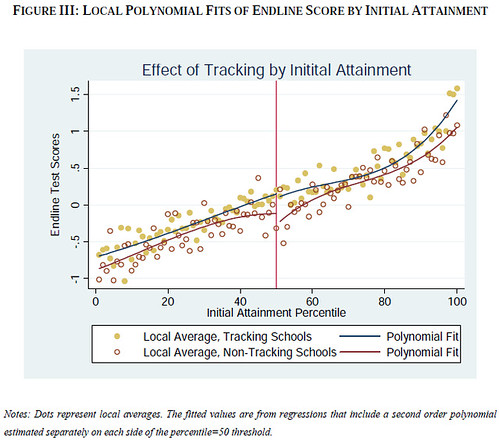Esther Duflo, Pascaline Dupas, and Michael Kremer wrote for American Economic Review, 101(5): 1739–74, DOI:10.1257/aer.101.5.1739,
Peer Effects, Teacher Incentives, and the Impact of Tracking: Evidence from a Randomized Evaluation in Kenya
To the extent that students benefit from high-achieving peers, tracking will help strong students and hurt weak ones. However, all students may benefit if tracking allows teachers to better tailor their instruction level. Lower-achieving pupils are particularly likely to benefit from tracking when teachers have incentives to teach to the top of the distribution. We propose a simple model nesting these effects and test its implications in a randomized tracking experiment conducted with 121 primary schools in Kenya. While the direct effect of high-achieving peers is positive, tracking benefited lower-achieving pupils indirectly by allowing teachers to teach to their level. (JEL I21, J45, O15)The first sentence is the standard “diversity” argument that CUEE keeps making. The authors state it so as to poing out that their study finds that it’s far from the whole story.
I find this part especially interesting:
Lower-achieving pupils are particularly likely to benefit from tracking when teachers have incentives to teach to the top of the distribution.That appears to mean that teachers don’t even need direct incentives to teach to the rest of the distribution; merely focusing on one part of the distribution also frees teachers to to focus on other parts of the distribution. And then imagine what if teachers also had incentives to focus on the lower-achieving pupils?
Here’s a slightly earlier version of the paper that doesn’t require signing up to get it.
It appears to me that the Chamber and CUEE have no arguments left for school consolidation. I agree with FVCS and Nimrod and both school systems and the Valdosta City Council that consolidation is a bad idea and registered voters in Valdosta should vote No to school consolidation Tuesday November 8th.
I also like Jim Parker’s idea:
How about as a first step the Chamber pledge an equivalent amount of money it and its members have spent on CUEE to the Boards of Education yearly, to be used as the teachers see fit?They could spend it on incentives for teachers to address all distributions of students.
-jsq
Short Link:

I’m definitely against consolidation, but I don’t like tracking either. When I was self employed breeding & training race horses in the 80’s I worked part time as a substitute teacher. The county system used a form of tracking that grouped students into slow, medium & fast learners. My children were in the top group so it worked well for them. However, I did not like the system because I observed a lot of students who lost the desire to try because they were classified in the slow learner group.
I finished the last month for one 7th grade class & had to sit in on the end of year decisions to pass or fail. One student was impossible to motivate in reading, but I found him to be highly intelligent. During the pass/fail record research it was discovered that he had come into the system that year as a local Sheriff’s Boy’s Ranch resident. His reading scores were accidently recorded as low, when they were actually high placing him into the slow learner group when he should have been in the fast learner group. I guess you could say he fell through the cracks because there was no parent to question his placement & his ranch house parent never checked on his records either. Regretably he had no incentive to try at all because he was totally bored & in my opinion victimized by the system.
There were other examples I observed that I felt were victims of the tracking system. I’m not a professional educator, but my observations made me distrust the value of tracking. Maybe I’m prejudiced against it because I’m always for the underdog, but I’d have to see a lot more research to favor it.
I just wanted to add that tracking systems were the result of state curriculum pushes & we don’t need any part of consolidation to push back if needed. In fact we don’t need consolidation to change anything that needs to be changed & their claims to consolidation being necessary for any improvements is part of their baseless propaganda. We need less government in our local school systems, not more, which is what we will get if the consolidation gateway is opened.
Vote No on Tuesday, November 8th!